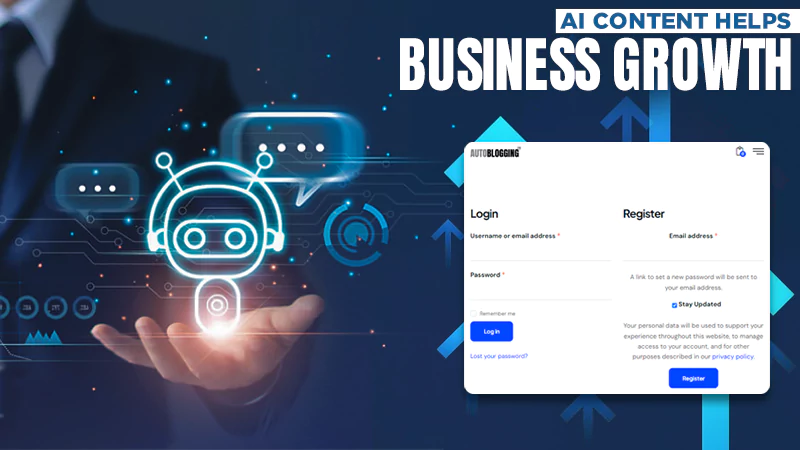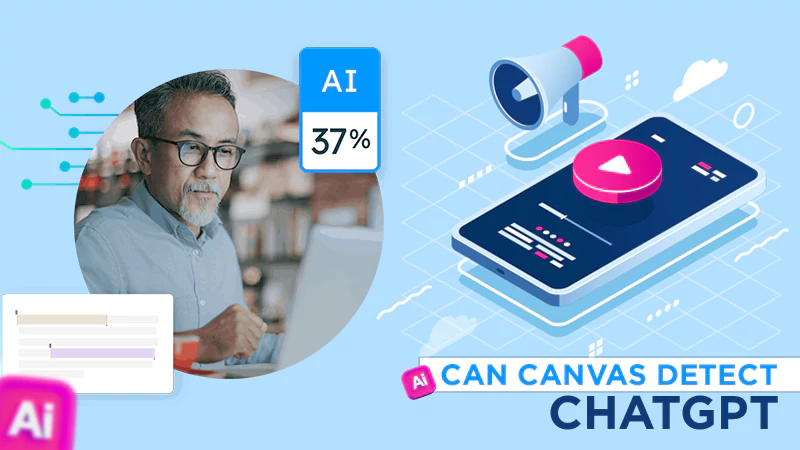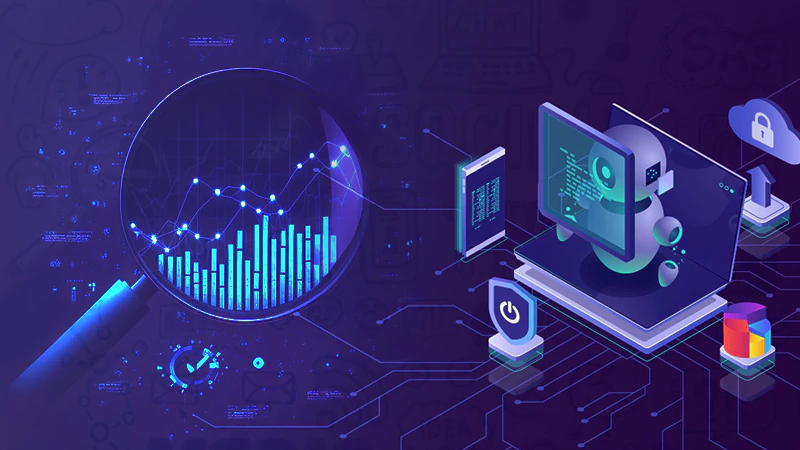How Generative AI Has the Potential to Add Trillions to the Global Economy
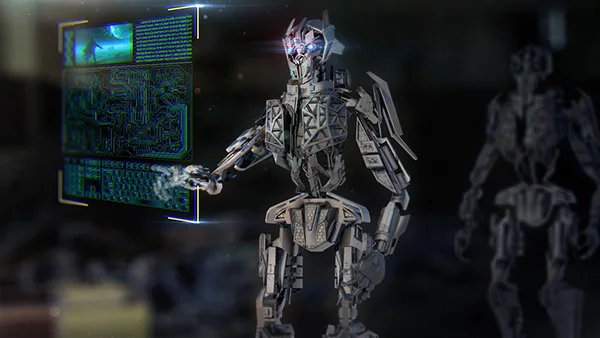
AI is becoming more of a normal part of our lives than you can even imagine.
From all the tech in our smartphones to the self-driving cars you see today, all have been made possible with the help of AI.
But, with more advanced applications, Generative Artificial Intelligence (Generative AI) has pushed past the boundaries of science fiction, bringing about a major change in how you work, live, and even play.
Its applications, like ChatGPT, Stable Diffusion, and others, have captured the imagination in a way that has never been seen before.
And thanks to its broad use, almost anyone can get into Generative AI without much experience.
So, what exactly is generative AI, you ask?
It is basically a branch of artificial intelligence that focuses on machines being able to generate content, like text, images, or even music, that closely resembles human-created material.
And, unlike traditional AI, which primarily focuses on data analysis and decision-making, generative AI utilizes neural networks and advanced algorithms to create original content on its own.
It has applications in various fields, from content generation and the creative arts to data synthesis and drug discovery.
Its capacity to simulate human-like creativity and generate diverse and contextually relevant output has made it a great tool with wide-ranging implications across industries.
So, as you get to know the great impact of generative AI on the global economy, you’ll first get to know its influence as well as the value it can bring to businesses across many industries.
DID YOU KNOW?
More than 58% of marketers use AI tools to optimize existing content, including ChatGPT, Anyword, Jasper, Copy.ai, Frase, and Quillbot.
Pushing The Boundaries of Digital Entertainment

Generative AI is expected to deliver substantial financial value to the leisure sector through its ability to enhance efficiency, personalize experiences, and optimize content creation.
One example of this value is in the realm of content recommendation systems used by streaming platforms like Netflix and Spotify.
They use generative AI algorithms to analyze user behavior and preferences and suggest personalized content for you.
This not only keeps users engaged and satisfied but also increases the possibility of keeping subscribers, ultimately leading to higher revenues for these platforms.
In the gaming industry, generative AI contributes to financial value by creating dynamic and immersive experiences that appeal to a broader audience. Games like “No Man’s Sky” leverage procedural generation, driven by Gen AI, to create vast and ever-evolving virtual worlds.
This innovation not only reduces development time and costs but also attracts a larger player base, resulting in increased game sales and in-game purchases, thereby boosting the financial performance of gaming companies.
Similarly, it simplifies content creation for leisure businesses. For example, AI-powered music composers such as Jukedeck generate original music tracks, reducing the expenses associated with hiring composers or licensing music.
These cost savings directly contribute to the financial bottom line of companies operating in the leisure sector.
Basically, Gen AI can pretty much enhance personalization, simplify the content creation process, and optimize user engagement.
This adds great financial value to the leisure sector, resulting in increased revenue and improved profitability for businesses in this industry.
Transforming Content Creation and Creative Industries

Generative Artificial Intelligence (Generative AI) is set to become a catalyst for economic growth, with the potential to add trillions to the global economy.
One of the sectors it is set to disrupt for the better is content creation and the broader creative industry. With the ability to generate text, images, and music, it simplifies creative processes, reducing costs and increasing efficiency.
For example, AI writing is revolutionizing content creation in advertising and marketing. You can now use AI-powered tools to generate compelling ad copy, design visuals, and even suggest optimal campaign strategies.
Companies like CopyAI have demonstrated how gen AI can craft persuasive content that resonates with target audiences, resulting in increased engagement and higher conversion rates.
This efficiency not only saves your time but also ensures consistency and effectiveness in messaging, ultimately boosting revenue across the industry.
Revolutionizing Healthcare and Drug Discovery
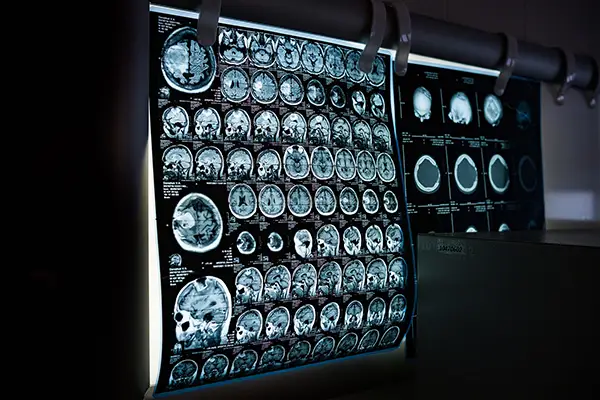
Another industry poised for transformation by generative AI is healthcare and drug discovery. The pharmaceutical sector, known for its lengthy and costly processes, is experiencing a significant shift thanks to AI-driven drug discovery platforms.
It is set up to be a game-changer in the healthcare and drug discovery sectors, with the potential to contribute trillions to these economies. Its impact is felt in various aspects, including data analysis, molecular design, and drug candidate discovery.
Gen AI can also help you to efficiently analyze vast datasets, including complex molecular structures and clinical trial results, which traditionally require significant time and resources.
Acceleration in data processing allows for quicker identification of potential drug candidates, reducing drug development timelines and associated costs.
Vector databases play a necessary role in this process by efficiently storing and retrieving complex data representations. They enable AI to access and manipulate data swiftly, facilitating rapid drug discovery and optimization.
One remarkable real-world example is BenevolentAI, which employs generative AI and vector databases to uncover novel treatments for diseases like Parkinson’s and COVID-19.
By streamlining the drug discovery process and identifying potential therapies more efficiently, gen AI not only helps you to save lives but also significantly reduces healthcare expenses.
This groundbreaking technology is not just adding value to the healthcare and drug discovery economies but also changing the way you approach necessary medical research and development, promising a brighter and healthier future.
Transforming Manufacturing and Supply Chains

The manufacturing sector is transforming with the integration of generative AI.
By optimizing production processes, quality control, and supply chain management, it is set to disrupt this industry for the better.
In the design phase, generative AI can create optimal product designs while adhering to specific constraints, such as material usage and manufacturing capabilities.
Companies like General Motors have employed AI to design lightweight yet structurally robust components for their vehicles, resulting in significant cost savings and improved fuel efficiency.
This efficiency not only reduces material waste but also enhances overall productivity and profitability.
Also, in supply chain management, it can predict demand more accurately, optimize inventory levels, and enhance logistics routing for maximum efficiency.
Retail giants like Amazon have successfully implemented AI-powered forecasting models to ensure timely deliveries and minimize operational costs.
By reducing inefficiencies across the manufacturing and supply chain spectrum, generative AI is making a substantial positive impact on the global economy.
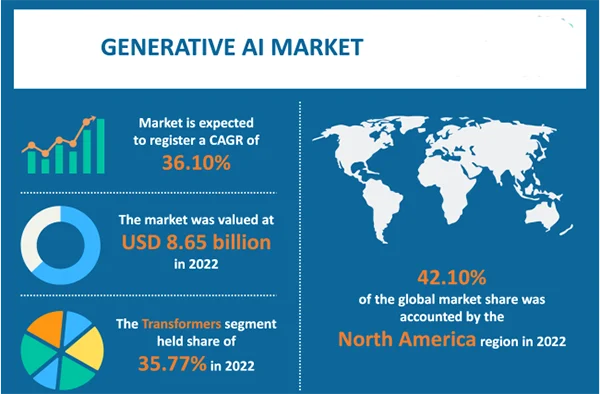
The market size in the Generative AI market is projected to reach $66.62 billion in 2024. The market size is expected to show an annual growth rate (CAGR 2024-2030) of 20.80%, resulting in a market volume of $207 billion by 2030.
Generative AI’s Trillion-Dollar Promise
Its impact on the global economy is undeniable.
So, even if you’re reshaping entertainment, revolutionizing advertising and marketing, expediting drug discovery, optimizing manufacturing, streamlining supply chains, or enhancing financial services, its potential to add trillions to the global economy is significant.
As businesses continue to capitalize on the power of generative AI, you expect to see a future marked by economic growth, innovation, and improved efficiency across industries.
The trillions it promises to contribute are not merely figures.
They represent a testament to the transformative power of human ingenuity and technological advancement.
